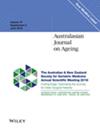Routine comprehensive geriatric assessment is associated with improved detection of cognitive disorders in older people with giant cell arteritis
Abstract
Objectives
Giant cell arteritis (GCA) carries an increased risk of stroke and blindness. International guidelines recommend older people receive routine comprehensive geriatric assessment (RCGA) during unplanned hospital admissions to improve health outcomes. This quality improvement study addressed the need for RCGA in older people with GCA at an Australian tertiary hospital. The aims of this study were to co-design, implement and evaluate a referral process for RCGA for hospitalised people 65 years or older with a new diagnosis of GCA and evaluate changes to the identification and management of falls and cognitive disorders (delirium, dementia and mild cognitive impairment).
Methods
Hospital stakeholders co-designed an RCGA referral pathway as a quality improvement change initiative. An observational cohort design measured implementation and outcomes. Consecutive patients aged 65 years or older with a new diagnosis of GCA were recruited for 15 months (n = 18), and outcomes were compared with a retrospective cohort of similar patients (n = 55). Descriptive summaries were compared between groups using non-parametric tests.
Results
Following implementation, all eligible patients received both RCGA and individualised interventions. Forty-four per cent of patients in the RCGA group were diagnosed with delirium, dementia or mild cognitive impairment compared to 18% in the usual care group (p = .03).
Conclusions
In this small population, implementation of an RCGA pathway was associated with increased detection of delirium, mild cognitive impairment and dementia, and allowed for implementation of individualised interventions.

 求助内容:
求助内容: 应助结果提醒方式:
应助结果提醒方式:


